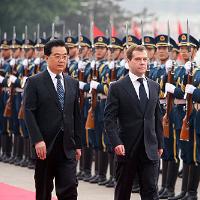Chinese President Hu Jintao and Russian President Dmitry Medvedev had a pleasant, two-day summit last week in Beijing. The agreeable nature of their public encounter was evident when Hu thanked the Russian government for its assistance to the victims of the May 12 earthquake in southwest China, which may have killed as many as 80,000 people. "Between friends, there can be no other kind of relations," Medvedev replied, while offering to provide additional help. Their only unpleasant comments were directed at third parties. The two governments expressed resentment of Western criticism regarding their human rights practices and actions abroad. A joint statement released by Hu and Medvedev complained that, "Both sides are concerned about the universal nature of the principle of respecting human rights, but believe that every state has a right to encourage and protect them based on its own specific features and characters." They also denounced the practice of employing "double standards" to judge other nations and opposed "using human rights to interfere with other countries' affairs." In contrast to the decision of many world leaders to boycott the opening session of the Beijing Olympics in August as a symbolic protest against Chinese policies regarding Tibet, Darfur, and other issues, the Russian Ambassador to China, Sergey Razov, pointedly stated that Moscow would send a "high-level" delegation to the opening ceremony and that the Russian contingent at the games would be one of the largest, with some 500 participants. In the joint communiqué issued after the summit, the Russian side denounced "Taiwan independence" and affirmed that "Tibet is an inalienable part of China's territory and it supports the Chinese side's measures taken in accordance with the law to safeguard social stability in Tibet as it is China's internal affair."
At Summit, Russia, China Talk Cooperation, Take Little Action

